Seri Harris—Fired as Women’s Water Polo Coach—Drops a Bomb on Swimming South Africa
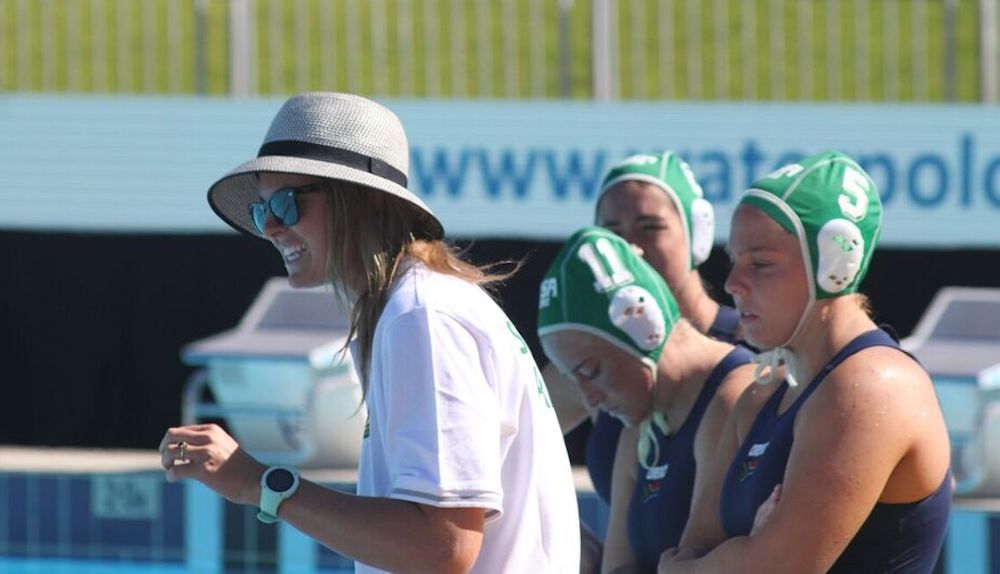
Editorial content for the 2019 World Championships coverage is sponsored by FORM Swim Goggles.
See full event coverage.
Follow FORM on Instagram at @FORMSwim #swimwithform

If you don’t know who Sarah “Seri” Harris is—and you’re a fan of water polo—you should. And you will. Dismissed last May as the head coach for South Africa’s women’s water polo team, Harris sent a thunderbolt through her country’s water polo establishment just as her former team was set to open play at the 2019 FINA World Championships. Calling into question why Swimming South Africa (SSA), which oversees the men’s and women’s national teams, fired her, the former national team player raised serious questions about her native country’s commitment to the sport.
Given Harris’ devotion to polo—in 2012 she acquired Australian citizenship just for a shot at Olympic glory, and took the top coaching position with South African women’s polo without pay—her accusations carry a great deal of weight. And she’s being supported both by former players and fellow ex-national team members. Kelsey White, former captain, and Rebecca Thomas quit this year’s World Championship squad in protest.
The SSA has seen fit to respond, stating that Harris was racist in her national team selections and was therefore removed for cause.
Following is an exclusive interview where Harris talks about her path to the top job in South African women’s polo, the “old boys” network that dominates the SSA and why taking a principled stand against Rowan Meth—head of the South African Technical Water Polo Committee—and others is the best thing to reform polo in her native land.
– You took a distinctive path to national team coach for your country.
After the 2011 world champs I ended up moving to Australia, became a citizen and played with the Australian Stingers from 2012 up to the Rio Olympics. And the reason why I made that decision was: for the last six or seven years of my playing career, my dream was to go to the Olympics. That’s what you work towards, and it’s the pinnacle of your career. Being a part of South Africa, we get an automatic berth to go to the Olympics because we are the only African team that competes.
We get that automatic berth, and we don’t have to play for it. And since I’ve been competing, our country has withdrawn from that berth every single four-year cycle. They give different reasons as to why. But after they withdrew us from the 2012 London Olympics, I lost so much heart and so much spirit, based off of everything that had also been going on, it forced me to leave.
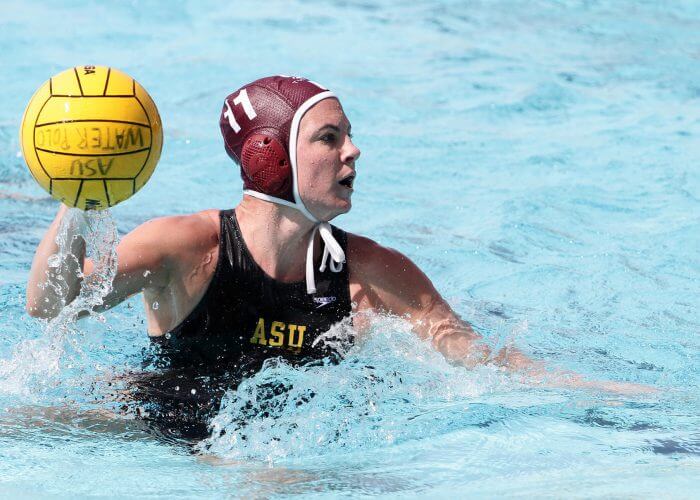
Harris playing for Arizonia State. Photo Courtesy: Jamie Hines / ASU Athletics
I went and experienced one of the highest levels of playing. When I was coming back, I was coming back with I guess—naive optimism. I’ve had all of these amazing experiences: I was in the States and [played] under Coach [Todd] Clapper [of Arizona State]. They were these amazing players that I got to play against and coaches that I got to play against.
[On The Record with Todd Clapper of Arizona State Women’s Water Polo]
And I went to Australia and got that experience. I came back to South Africa with this dream that I could bring some of the professionalism that I had been fortunate enough, as a South African, to attain in two different countries. And bring it to South Africa to try make a change. I thought that it was about time.
Some of the people that are all still involved now in the woman’s team for South Africa were involved in the process when I was a player. We’re talking 15 years now that these people have been involved, either in an administration capacity, a selection capacity, or a coaching capacity.
I felt like it was time for a change. I had watched all of my friends that were part of the South African system that I left, and they gave me support. I watched one after the other quit, because of all of the drama and all of the unfair selection and the lack of transparency. And just the lunacy that was going on. Some of the most amazingly talented players quitting the sport that we all loved and played together, only because of what was going on with [neglecting] the players.
[Horror start for SA women’s water polo side in South Korea]
And I had such a passion and—considering this was my home and I grew up here—to come back and make a difference. I came back with this optimism of, maybe I can do something, maybe I can make a change. And that’s when I started in November, with this fire to bring some professionalism to a sport that showed none.
– Did the South African swimming federation embrace the vision that you have for women’s water polo at South Africa?
It’s an interesting federation—probably unlike any other—in the fact that there isn’t a lot of communication between the different facets within the federation. Most federations like Australian Water Polo and USA Water Polo, they’re completely separate from [their] swimming federation; you have Swimming Australia, and you have Water Polo Australia. With us, we have Swimming South Africa and all of our swimming disciplines—swimming, artistic swimming, diving, water polo, open water swimming. They all fall under one federation.
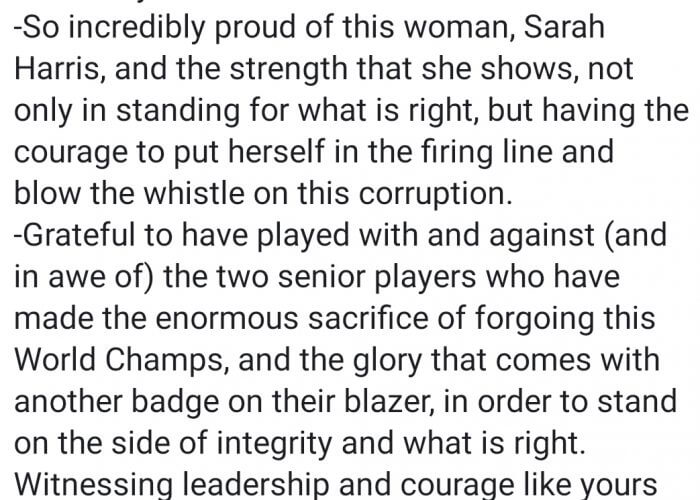
Victoria Quarmby Hawkins, South Africa polo player and coach
I’ve never heard from our CEO [Shaun Adriaanse]. He’s never directly communicated with me. There’s all of these subcommittees that are involved, and they kind of run they own show.
The communication that was coming to me was: no communication at all. I didn’t even get an official appointment date as coach. I didn’t get a contract—I was a volunteer. They’re not paying [me]. Why I came to be the coach was—like I wrote in my blog—the woman’s team had gone through so many coaches in such a short period, and some of the men that had been appointed coaches had inappropriate behavior with some players, and had been asked to move on.
And it came to a point where they had no one else to go to. [Their thinking was:] Here’s this woman doing amazing things with young age groups. Let’s get her in because one, we’re tackling a female block. And she seems to be doing a great job. Let’s see what she [can do].
But I was never really given any [direction]. I was doing my own thing, then either getting into trouble or getting praised for it, because I’d either gone against the Swimming South African bylaws, or I had done something great. I knew what I needed to do to run a successful program. And I just went and ran with it. And within that, it obviously has gotten in me into a lot of trouble because they want you to do things completely their way.
– South Africa has enjoyed success in other aquatic sports, so a commitment to succeed exists. Is water polo not receiving the support that it needs to thrive?
Absolutely. That’s the whole problem with having our water polo under swimming. We get most of our attention from our swimmers. Chad Le Clos has won medals. Cameron van der Burgh [has] won medals. Our swimmers are the people that have brought us the most success in aquatics. When it comes to worrying about anything, the federation is worrying about the swimmers.
They don’t really care about water polo… [it] gets pushed to the wayside. There’s no funding that’s given to it. Whereas with swimmers, even for world championships. Players for South Africa have to pay to go to world championships. It’s not a lot of money but they have to pay. Whereas the swimmers, they’re on a tier system. And if you are an Olympic swimmer like van der Burgh or Clos, you’re not paying to go to world championships.
– You took on this endeavor without financial commitment—and apparently without the support of the federation. Is this why you’re no longer the head coach?
I would have to say 100% that water polo gets absolutely zero support from our federation. They only give us attention when they needed something. If we’re going on a tour, we’re obviously bringing in a lot of money because everything is self-funded. So, the tour gets put forward.
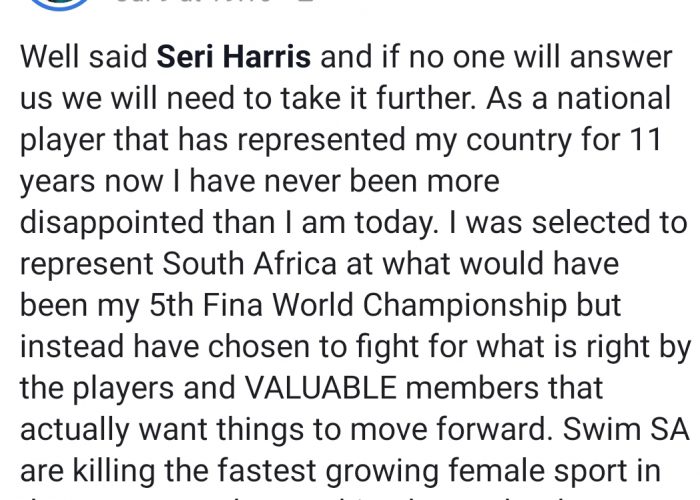
Kelsey White who quit South Africa national team
But nothing is really done from the federation—we’re regarded as a very small sport. It’s one of the reasons we don’t go to the Olympics—because we not medal contenders. There’s also a lot of politics with regards to players of color in South Africa. I’m not sure if you’re aware, but you have to pick certain amounts of players of color in each of your teams, as part of our development program.
– It sounds that there’s a conflict between outcomes—which is how well you do in the water—and perceptions, which is how does your team looks to outsiders.
It’s an interesting question because, regardless of whether I was the coach or not, from the outside our team looks would have been the same. The issues that came along were because there’s no direct communication, and there’s actually no one that even knew what I was doing with my program. I brought in standards that no coach had brought in before.
I was doing athlete management daily. I was making sure that girls were consistently doing their swim [schedules], and I was checking in weekly, which swim loads have you done. Girls were held accountable to me. I also incorporated all the coaches, so they knew exactly what was expected of them.
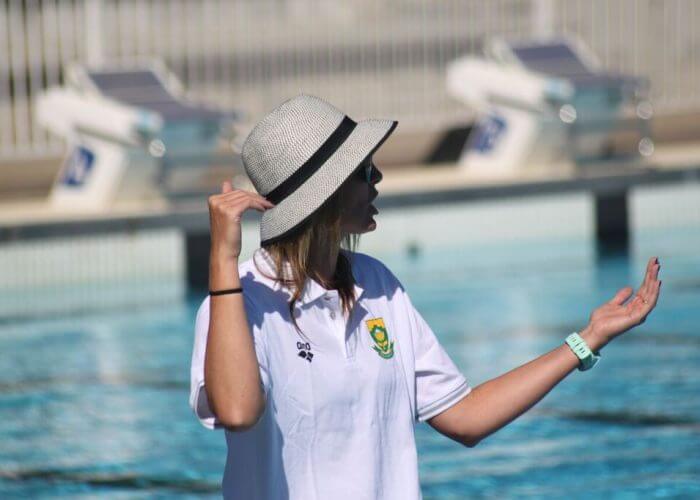
Not in a lonely place. Photo Courtesy: S. Harris
Where the problem comes in is, you’ve got a coach who’s saying this is what’s expected and then you’ve got a federation [that] doesn’t have any clue what expectations I’ve set. Then they come in before the world championships and say, pretty much the exact opposite than what I’ve been saying to players for eight months. I’ve been saying you have to do these swim times, and you have to meet these requirements, and you have to do X, Y, and Z before [being considered] for the world championship squad, let alone allowed to come to large group training camp. Then you’d got the federation, three weeks before training camp saying it’s open to anyone. You don’t have to meet any requirements. You can just come, and anyone can be picked.
Which is exactly what happened.
I was the first coach who was willing to give so much of my time for free, to put these structures in place. And make deadlines and make players accountable, and make sure we’re actually fit.
Because the one thing we can control actually is our conditioning. And then you’ve got a federation that’s coming in, has no idea, because even though you’ve written them a million emails, you don’t even know that they’ve read those emails, and may come in and do a complete 180 on you.
And it became very confusing for the players. I thought [certain] girls are going to be coming to the selection camp—I identified 31. And then [the swim federation] said: No, you can’t exclude anyone. It’s an open for everyone.
For six months, I had got a plan in process, and the girls had been working towards this plan, only to be [told of a change], two to three weeks before we’re going to be selecting our world championship side. Be getting completely bulldozed and told that none of it matters. None of this swimming that they did mattered. It was all going to come down to these four days and the selectors that were going to be selecting, didn’t coach women and didn’t know who they were.
– I noted there were selection criteria for the Intercontinental Cup it says to be eligible for selection, an athlete must have participated in the national training selection camp. This was the standard that you were trying to set?
Exactly right. That same standard was not put in place for a championship by Swimming South Africa.
– So why would there be a change of heart?
To be honest, I don’t think that they cared about the Intercontinental Cup. I speak about it in my blog about how for Intercontinental I was allowed to select my team, with three other coaches that I had picked. There was no talk about bylaws that coaches had no say in selection. There was no talk about that had to be selectors that came down to the camp. I got to do what I wanted for that camp. The head of the TC was at that camp and allowing me to do that.
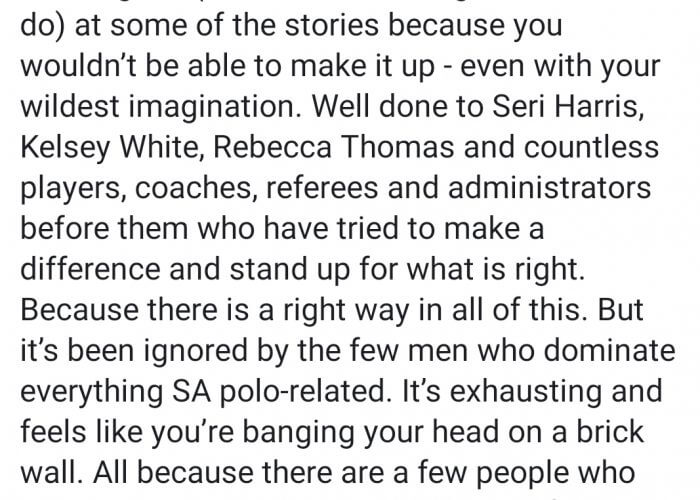
Laura Baere, former South Africa national team member
Then, all of a sudden world championship is all coming along, and that’s what they care about, apparently. Because all these rules started coming. That they said, no, as a coach, you’re allowed no selection. It’s in the bylaws. And I’m saying, this makes no sense because for Intercontinental, I picked my team. Why all of a sudden there’s a difference? No, these are the rules.
And I think what it actually comes down to is that: there are bylaws in place that they don’t hold themselves accountable to, but they will use them whenever it suits them. And for them, it suited them to use the bylaws for World Championships but not for Intercontinental.
– Did you get results out of the Intercontinental Cup that you felt were positive?
I asked if anyone [from the federation] had even watched our games. Not even the head coach, who’s in charge of coaching, watched our games from Intercontinental. That’s what we’re talking about—people that really don’t care. They may have seen the score line, but if you look at the score line and you look at our results against the US, 22 to 5, it looks like an absolute beating.
But if you look at what happened during that game, how many exclusions our team got, and that’s the most goals we’ve ever scored against the U.S. Or, look at our game against Australia where they won 21 – 3. We earned 18 ejections in that game—the most we’ve [ever] earned. It shows that we have no experience at all with extra man, and we’re not good playing against that pressure. It also shows our inexperience. But even players from other countries are coming up to us and saying: Holy smokes, that feels like a completely different outlay. You guys are fit. You guys are strong. You’re making us work.
Some teams used to go and do a swim set after playing South Africa. Now, we were actually pushing teams. We might not be experienced, and we might not be able to take the wins, but we are progressing. And the players were so positive. Against Kazakhstan we had a narrow defeat. Against New Zealand, we were up and then had a narrow defeat.
There were so many positives that came out of Intercontinental, [ones] that everyone in the water polo community could feel. They all knew and were all watching. But, the federation wouldn’t have watched one of those games. They maybe would’ve looked at the score. I have no idea if a report was written for that on them. And I just don’t think they cared to be honest.
Is Rowan Meth, head of the Technical Water Polo Committee, an impediment to change?
Yes. He’s part of the technical committee, the convener of the technical committee, and there’s other members on that committee. It seems to me that he runs the show.
What I have experienced, he would show up at all of my training camps, and he was at both of my selections. I have been told that he is the person who made the suggestion that I needed to be removed as coach. So, he has a lot of power. And it feels like he is the driving force because he is the only person [from] Swim South Africa that we see consistently. You can say that Sean Adrienne, our president, is making these decisions, but Sean Adrienne is never around. He doesn’t speak to any of us.
The person that does is [Meth]. All signs are leading to the fact that he’s the one that’s making these final decisions. And they are getting approved by the president or the CEO.
Meth represented South Africa as a player; wouldn’t the idealism and expertise that you bring dovetail with what he would want to see realized for water polo in your country?
When I was playing in my first world championships, which was in 2009, he was the manager of our team. I know that he used to play, but I haven’t known him as a player—I don’t know what playing experience he has. I’m not sure what his motives are.
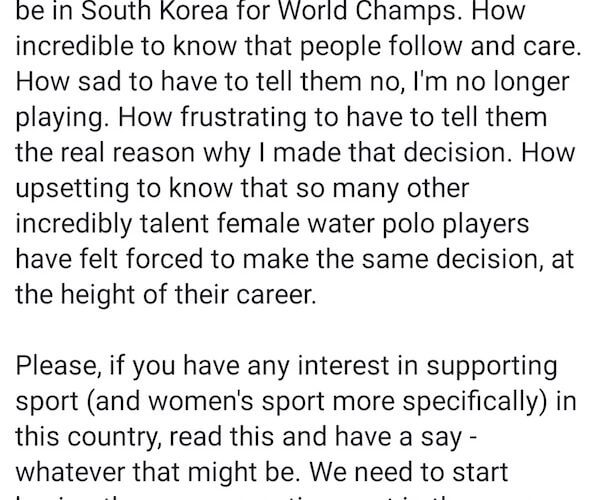
Rebecca Thomas, who quit South Africa national team
But it seems to me a lot of these people like Rowan and other managers, they are more interested in going on a free tour, on a free holiday to the world championships. He’s been the manager for world championships since 2009, and I think he’d gone to nearly every world championships since. But he isn’t involved in coaching and isn’t involved in a management position at all, throughout the year. But when it comes to world championships, his name is always down as the manager.
For outsiders, it’s very hard to fathom why people wouldn’t want your sport to grow, and why people wouldn’t want things to be better. But it is so much that goes on behind the scenes here, and there’s a lot of personal gain.
What is more important than what can South Africa, South African water polo get out of this?
– You point out that there are minors on the roster but there are no female coaches or support staff. Is this exceptional for South African women’s water polo? Or is it you represented some sort of change?
Well, I’m the first ladies national team coach. So really having me in there was like a huge kind of stigma-breaking. We’ve got a female, [but] obviously that didn’t last very long.
As far as management, when I went on my first world championships, there was no female management. On my second, [there was one]. The last couple of years, they’ve had a female on board. This year, when they fired me, all of a sudden, there [wasn’t] a female in management. And once again it comes back to my point [about] self-gain. Would someone like Rowan Meth, who’s down as the manager, take himself off and not go on a tour, to put a female in there for the benefit of the athletes? And the answer is no, because he didn’t do that.
– What will make substantial change for South African water polo?
A lot of people have complained—it’s not just me. When this got announced, the main point that was that people wanted a female representative for the ladies. And, as far as I’m aware, in every other country, it’s mandatory that if you have an all-female team, you have to have a female on staff for your players.
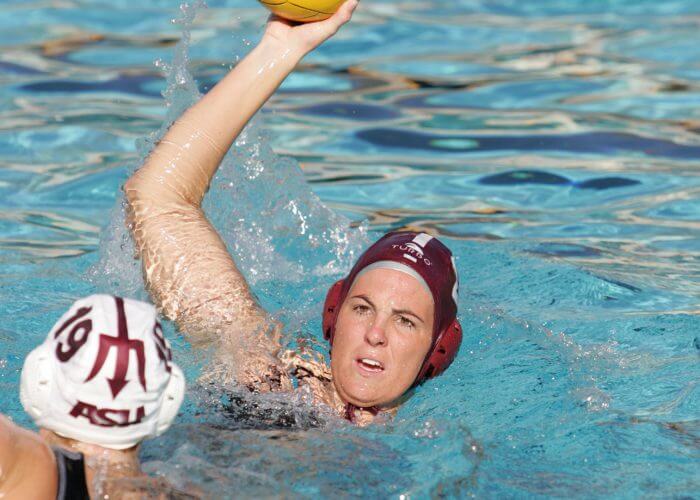
Photo Courtesy: ASU Athletics
It makes so much sense. Especially for protection of your coaches, it makes it so much sense with an all-female team. And I thought that we were in a day and an age now where that was just a prerequisite. When I got removed I thought, when I even got informed that that was a possibility, I thought, okay, well there’s going to be a reshuffle then at management because they have to bring a female on board, especially because there’s minors. But that didn’t happen.
And regardless of the amount of people that have complained about it, it has fallen on deaf ears. And it has been an absolute… Oh, I don’t want to say horror show, but it’s been a very difficult road for me these last eight months; I’ve dealt with quite a lot of stuff. I’ve lost my mom already.
I would say these last eight months have been the most difficult. And I would say the most pinpointing factor of that difficulty would be that I’m a woman and what I’d had to deal with because of that.
– Clearly there’s many more chapters to be written in your career with the sport.
I was shown the door when I was 30 and I left. And when I was shown that door the first time, my younger self was saying I’ll never get involved ever again. And it’s quite difficult because I’m obviously working for African water polo, not water polo in general. And when I came back, I was given a second chance.
I’m kind of in that boat right now, that unless there’s some dramatic and massive shuffling around, and inclusion of females and the right people put into place, I don’t see how it’s possible for me to get involved [again] with South African [national] water polo. I’m involved here at a school level, and I’m very passionate about getting a lot of our players overseas, especially from the American collegiate system. We send a lot of our players over to the States, because it’s the best system in the world for women to play in.
I’m only 31 years old. From a head coaching perspective, I’m still learning and growing myself. I want to learn from the best, and to keep adapting. And it’s very difficult to do that in this environment. With regards to what’s next, my fiancé is American, so there’s a lot of talk about, depending on what happens from the scenario, we might actually end up moving so that I can pursue and grow and learn under some of the greats, and expand my knowledge as a coach.
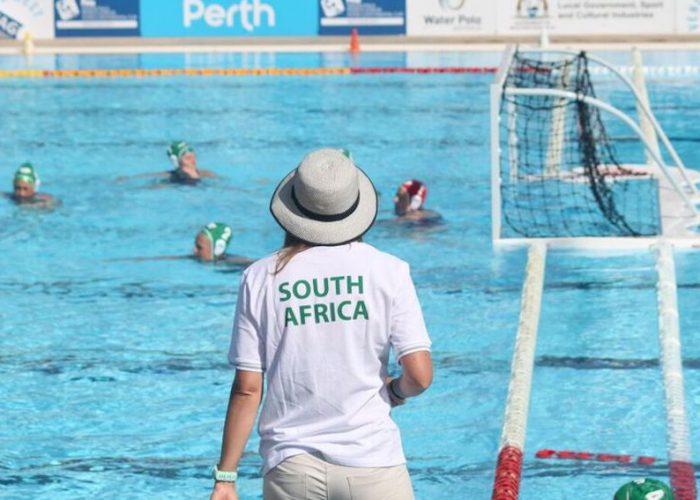
Where she always wanted to be. Photo Courtesy: S. Harris
And maybe one day there’ll be a chapter three in the Swimming South African chapter for me. But, I also have to think of my career moving forwards. And being a national team coach allowed me to grow because of the caliber of teams you’re playing against. And, because you are around those great coaches that are so awesome. I had huge chats with Greg McFadden, who is the Chinese coach. And with Predrag Mihailović who’s the Australian coach. And with Adam Krikorian, the American coach.
[On The Record with Adam Krikorian, US Women’s Water Polo Head Coach]
Everyone is so open to helping. If I have a water polo question and a tactical question, I can go to those guys, even though they’re supposed to be my enemies. I can go to them and say: This is what I was thinking [about] this thing. What are your thoughts?
And that platform would enable me to grow and to develop as a coach. Whereas now, that’s being stunted. In order for me, for the what’s next chapter, to become an even better coach, and to learn from these amazing people, I might have to move to do that.
.jpg)

- 2017 WORLD CHAMPIONSHIPS
- OFFICIAL MEET PAGE
- WATCH RACE VIDEOS
- LIVE STREAM
- DAY 1 SWIMMING RESULTS
- DAY 2 SWIMMING RESULTS
- DAY 3 SWIMMING RESULTS
- DAY 4 SWIMMING RESULTS
- DAY 5 SWIMMING REULTS
- DAY 6 SWIMMING RESULTS
- DAY 7 SWIMMING RESULTS
- DAY 8 SWIMMING RESULTS
- RESULTS FOR ALL AQUATIC SPORTS
- DAY 8 PRELIMS HEAT SHEETS
- DAY 8 FINALS START LISTS
- FORM Swim for Coaches
- FORM Swim Sponsorships
- FORM Swim Contests
- FORM Swim Media




Same people 20 years on and ruining the sport
Wow this is a bit of an eye opener!! How can this still be going!!
As a player I “tried out” for a spot on the Olympic festival team in the 80’s. I was not good enough, I was outplayed by many, but not a few that where picked. They came from power house schools and they had potential, but more importantly, they had the backing from the coaches. Harris seems to me to have the same system. The idea that to participate you had to swim her workouts is stupid. Come for the try outs, if you are in shape it will show. Also, no offence to her but the article needs to go deeper into the racist allegations.
Don’t be an idiot. A high level of fitness is not optional.
It’s not optional. It’s ESSENTIAL. Fitness is no 1.
Really? You still want to play the racist card? The U16 & U18 tour to New Zealand cost each family R40,000 and the athletes also did major fund raising for players of color who were chosen but could not afford to go. If the changes Sarah is fighting for happen more funding will become available and water polo will open up for everyone and the biggest winners will be players of color. If you cannot come up with positive input I suggest you butt out of the debate.
I’m afraid you are incorrect- it will absolutely NOT show if you are in good shape playing against any lame duck at an open camp. Swim sets and tests are essential when the type of game you can play locally differs so significantly to what will be expected of you internationally.
Conditioning is not an option – it is an absolute necessity.
Ayanda Maphumulo
Go Seri go!
Kyra Roos
Christelle Taylor
We support you Sarah you are brave and true to the sport of waterpolo x
I agree Graham Du Toit. Unfortunately not only within Water Polo but also within many more sport federations in South Africa. Coaches and managers devote their life above their families with no pay and this is the thankyou you get.
And I see that the swimmers federation has just taken on FINA. They want clear and transparent explanations how money is spent. Interestingly Mr Ramsamy is on the FINA board. Just look up who heads swim SA. I have been peropherally involved in meetings about water polo at league level and have consistently heard the members speak dismissively of the fact that Swim SA want access to league fees which they don’t understand considering Swim SA complete lack of interest or funding of Water Polo that I have experienced.
Shocking!! Joffers investigation into SA Sport and corruption is spot on!! Well done ladies for standing firm against bully boy tactics.
Seems like sport is no longer sport, but politics! So sad ?
Amy Hare shambles!
Chaos ?
Bruce Sneddon , interesting read
Unbelievable how coaches are treated
That is so shocking. Glad someone brought out the truth, now let’s hope someone is brave enough in top level management to deal with it
Well done for speaking out Seri Harris!
Sarah Harris pse take this minefield to Carte Blanche. Lets get these a$eholes into the public spotlight????
I agree. Get as wide a platform as possible. I have known Sarah Harris for a long time. She has no self interest at heart but only the sport she has loved to play over the years. The administration has been a cancer in water polo for many years. As they say “ It’s time for drastic change”
Shameful. ??
Tracey De Beer Putzier
Keep shining a light on this Seri!
Nathan Palmer, Seri Harris… just stumbled upon this. Great job Seri!!
Waterpolo is an armature sport run by complete armatures and freeloaders.
Their “youth policy” is a joke (pick kids who’s parents can pay for their trip” and their inability to fund or retain senior player is a significant concern. Loss of Kramer league, the collapse of provincial senior cup competitions (A teams, B teams and U19) and the nation club competition has reduced the opportunity for players to show their metal and play against the best in the country.
Swim SA reps and officials do little or nothing for the sport but never fail to bank the benefits, free trips and salaries while volunteers do most of the work.
While players (male and female) and skills have significantly improved thru the various school feeder system, few go one to make an impact at senior level. Result – “Boys against men” when SA competes internationally. Under cooked, under trained, under competed, certainly not representative of the talent available.
25 years after readmission, the directors of the sport have done little to provide direction or alignment for waterpolo post school level. If a blue print exists it is a complete secret/mystery. They do however have no problem taking our money!
Well said Mike, could not agree more.
Sarah has dedicated years to water polo, and has far more experience of the game than the dictaters
Sarah from experience knows the perils or pleasures of male coaches that have preyed on vulnerable teens! She is so right in petitioning for female team coaches!!!